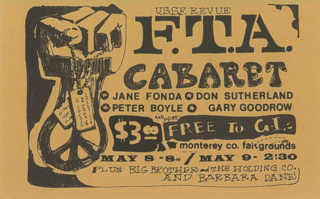
The FTA Show, a play on the common troop expression "Fuck The Army", was a 1971 anti-Vietnam War road show for GIs designed as a response to Bob Hope's patriotic and pro-war USO tour. The idea was first conceived by Howard Levy, an ex-US Army doctor who had just been released from 26 months in Fort Leavenworth military prison for refusing orders to train Green Beret medics on their way to the Vietnam War. Levy convinced actress Jane Fonda to participate and she in turn recruited a number of actors, entertainers, musicians and others, including the actors Donald Sutherland, Peter Boyle, Garry Goodrow and Michael Alaimo, comedian and civil rights activist Dick Gregory and soul and R&B singer Swamp Dogg. Alan Myerson, of San Francisco improv comedy group The Committee, agreed to direct, while cartoonist and author Jules Feiffer and playwrights Barbara Garson and Herb Gardner wrote songs and skits for the show. Fred Gardner, the originator of the antiwar GI Coffeehouse movement, became the Tour's "stage manager and liaison to the coffeehouse staffs." At various times other actors, writers, musicians, comedians and entertainers were involved. The United States Servicemen's Fund (USSF), with Dr. Levy as one of its principal organizers, became the official sponsor of the tour. The anti-Vietnam War USSF, promoted free speech within the US military, funded and supported independent GI newspapers and coffeehouses, and worked to defend the legal rights of GIs. Sponsorship was later taken over by a group called the Entertainment Industry for Peace & Justice (EIPJ).
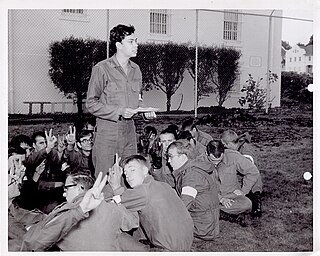
The Presidio mutiny was a sit-down protest carried out by 27 prisoners at the Presidio stockade in San Francisco, California on October 14, 1968. It was one of the earliest instances of significant internal military resistance to the Vietnam War. The stiff sentences given out at courts martial for the participants drew international attention to the extent of sentiment against the war within the U.S. military, and the mutiny became "[p]erhaps the single best known event of the domestic GI movement".

F.T.A. is a 1972 American documentary film starring Jane Fonda and Donald Sutherland and directed by Francine Parker, which follows a 1971 anti-Vietnam War road show for G.I.s, the FTA Show, as it stops in Hawaii, The Philippines, Okinawa, and Japan. It includes highlights from the show, behind the scenes footage, local performers from the countries visited, and interviews and conversations with GIs "as they discuss what they saw in battle, their anger with the military bureaucracy, and their opposition to America's presence in Indochina." Called by Fonda "a spit and a prayer production" it was far from a big budget Hollywood movie, or even a well-funded documentary. While the movie "is raw," it "underscores how infectious the movement of the 60s and 70s was", and chronicles both the Tour itself as well as the soldiers who came to see it and "the local talent of organizers, labor unions and artist/activists" in the countries visited.

The Fort Hood Three were three United States Army soldiers – Private First Class James Johnson, Private David A. Samas, and Private Dennis Mora – who refused to be deployed to fight in the Vietnam War on June 30, 1966. This was the first public refusal of orders to Vietnam, and one of the earliest acts of resistance to the war from within the U.S. military. Their refusal was widely publicized and became a cause célèbre within the growing antiwar movement. They filed a federal suit against Secretary of Defense Robert S. McNamara and Secretary of the Army Stanley Resor to prevent their shipment to Southeast Asia and were court-martialed by the Army for insubordination.
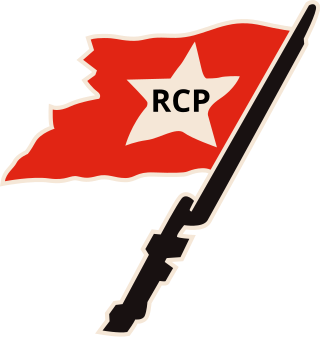
The Revolutionary Communist Party, USA is a new communist party in the United States founded in 1975 and led by its chairman, Bob Avakian. The party organizes for a revolution to overthrow the system of capitalism and replace it with a socialist state, with the final aim of world communism. The RCP is frequently described as a cult around Avakian.
Andrew Dean Stapp was an American activist known for forming the American Servicemen's Union, an unofficial union for the U.S. military, in opposition to the Vietnam War.

The Concerned Officers Movement (COM) was an organization of mainly junior officers formed within the U.S. military in the early 1970s. Though its principal purpose was opposition to the U.S. involvement in the Vietnam War, it also fought for First Amendment rights within the military. It was initiated in the Washington, D.C., area by commissioned officers who were also Vietnam Veterans, but rapidly expanded throughout all branches and many bases of the U.S. military, ultimately playing an influential role in the opposition to the Vietnam War. At least two of its chapters expanded their ranks to include enlisted personnel (non-officers), in San Diego changing the group's name to Concerned Military, and in Kodiak, Alaska, to Concerned Servicemen's Movement.

GI's Against Fascism was a small but formative organization formed within the United States Navy during the years of conscription and the Vietnam War. The group developed in mid-1969 out of a number of sailors requesting adequate quarters, but coalesced into a formal organization with a wider agenda: a more generalized opposition to the war and to perceived institutional racism within the U.S. Navy. Although there had been earlier antiwar and GI resistance groups within the U.S. Army during the Vietnam era, GI's Against Fascism was the first such group in the U.S. Navy. The group published an underground newspaper called Duck Power as a means of spreading its views.

The Movement for a Democratic Military (MDM) was an American anti-war, anti-establishment, and military rights organization formed by United States Navy and Marine Corps personnel during the Vietnam War. Formed in California in late 1969 by sailors from Naval Station San Diego in San Diego and Marines from Camp Pendleton Marine Base in Oceanside, it rapidly spread to a number of other cities and bases in California and the Midwest, including the San Francisco Bay Area, Long Beach Naval Station, El Toro Marine Air Station, Fort Ord, Fort Carson, and the Great Lakes Naval Training Center.

GI coffeehouses were coffeehouses set up as part of the anti-war movement during the Vietnam War era as a method of fostering antiwar and anti-military sentiment within the U.S. military. They were mainly organized by civilian antiwar activists, though many GIs participated in establishing them as well. They were created in numerous cities and towns near U.S. military bases throughout the U.S as well as Germany and Japan. Due to the normal high turnover rate of GIs at military bases plus the military's response which often involved transfer, discharge and demotion, not to mention the hostility of the pro-military towns where many coffeehouses were located, most of them were short-lived, but a few survived for several years and "contributed to some of the GI movement's most significant actions". The first GI coffeehouse of the Vietnam era was set up in January 1968 and the last closed in 1974.

Waging Peace in Vietnam: U.S. Soldiers and Veterans Who Opposed the War is a non-fiction book edited by Ron Carver, David Cortright, and Barbara Doherty. It was published in September 2019 by New Village Press and is distributed by New York University Press. In March 2023 a Vietnamese language edition of the book was launched at the War Remnants Museum in Ho Chi Minh City, Vietnam.

The G.I. movement was the resistance to military involvement in the Vietnam War from active duty soldiers in the United States military. Within the military popular forms of resistance included combat refusals, fragging, and desertion. By the end of the war at least 450 officers were killed in fraggings, or about 250 from 1969–1971, over 300 refused to engage in combat and approximately 50,000 American servicemen deserted. Along with resistance inside the U.S. military, civilians opened up various G.I. coffeehouses near military bases where civilians could meet with soldiers and could discuss and cooperate in the anti-war movement.
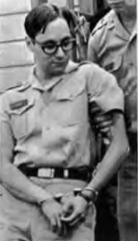
The court-martial of Howard Levy occurred in 1967. Howard Levy was a United States Army doctor who became an early resister to the Vietnam War. In 1967, he was court-martialed at Fort Jackson, South Carolina, for refusing an order to train Green Beret medics on their way to Vietnam. He said it "became clear to me that the Army [was using medics] to 'win hearts and minds' in Vietnamese villages - while still burning them to the ground in search-and-destroy missions." He considered the Special Forces "killers of peasants and murderers of women and children".
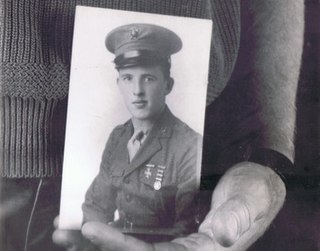
A Matter of Conscience: GI Resistance During the Vietnam War is an artist book published in 1992 at the time of the Addison Gallery of American Art exhibition, “A Matter of Conscience” and “Vietnam Revisited.” It contains oral histories of Vietnam era GIs, gathered and edited by Willa Seidenberg and William Short, and 58 photographs by William Short. Each oral history is complemented by a portrait in which the Vietnam veteran holds an object of some significance such as a newspaper clipping, a legal document, a book, or photograph. The large black and white photographs allow readers to see the veteran while reading the brief but moving oral histories to learn why they turned against the Vietnam War. The veterans' stories and portraits were collected over a five-year period and have been exhibited throughout the United States, Vietnam, Japan and Australia. A number of them were also included in the book Waging Peace in Vietnam: U.S. Soldiers and Veterans Who Opposed the War edited by Ron Carver, David Cortright, and Barbara Doherty. It was published in September 2019 by New Village Press.

The court-martial of Susan Schnall, a lieutenant U.S. Navy nurse stationed at the Oakland Naval Hospital in Oakland, California, took place in early 1969 during the Vietnam War. Her political activities, which led to the military trial, may have garnered some of the most provocative news coverage during the early days of the U.S. antiwar movement against that war. In October 1968, the San Francisco Chronicle called her the “Peace Leaflet Bomber” for raining tens of thousands of antiwar leaflets from a small airplane over several San Francisco Bay Area military installations and the deck of an aircraft carrier. The day after this “bombing” run, she marched in her officer’s uniform at the front of a large antiwar demonstration, knowing it was against military regulations. While the Navy was court-martialing her for "conduct unbecoming an officer", she was publicly telling the press, "As far as I'm concerned, it's conduct unbecoming to officers to send men to die in Vietnam."
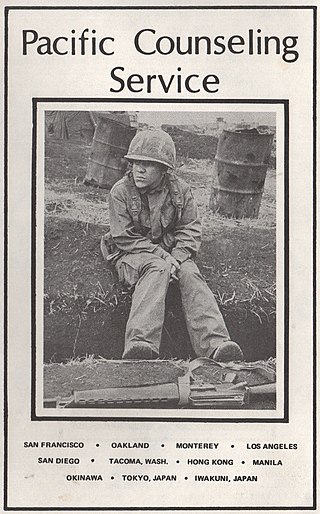
The Pacific Counseling Service (PCS) was a G.I. counseling service organization created by antiwar activists during the Vietnam War. PCS saw itself as trying to make the U.S. Armed Forces "adhere more closely to regulations concerning conscientious objector discharges and G.I. rights." The Armed Forces Journal, on the other hand, said PCS was involved in "antimilitary activities", including "legal help and incitement to dissident GIs." PCS evolved out of a small GI Help office started by a freshly discharged Air Force Sergeant in San Francisco, California in January 1969. The idea rapidly caught on among antiwar forces and within a year PCS had offices in Monterey, Oakland, and San Diego in California, plus Tacoma, Washington. By 1971 it had spread around the Pacific with additional offices in Los Angeles, Hong Kong, Okinawa, the Philippines, as well as Tokyo and Iwakuni in Japan. Each location was established near a major U.S. military base. At its peak, PCS was counseling hundreds of disgruntled soldiers a week, helping many with legal advice, conscientious objector discharges and more. As the war wound down, ending in 1975, the offices closed with the last office in San Francisco printing its final underground newspaper in 1976.
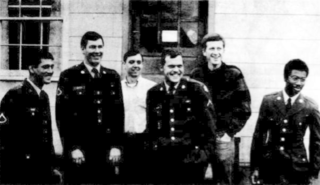
The Fort Lewis Six were six U.S. Army enlisted men at the Fort Lewis Army base in the Seattle and Tacoma, Washington area who in June 1970 refused orders to the Vietnam War and were then courts-martialed. They had all applied for conscientious objector status and been turned down by the Pentagon. The Army then ordered them to report for assignment to Vietnam, which they all refused. The Army responded by charging them with "willful disobedience" which carried a maximum penalty of five years at hard labor. The six soldiers were Private First Class Manuel Perez, a Cuban refugee; Private First Class Paul A. Forest, a British citizen from Liverpool; Specialist 4 Carl M. Dix Jr. from Baltimore; Private James B. Allen from Goldsboro, North Carolina; Private First Class Lawrence Galgano from Brooklyn, New York; and Private First Class Jeffrey C. Griffith from Vaughn, Washington. According to the local GI underground newspaper at Fort Lewis, this was the largest mass refusal of direct orders to Vietnam at the base up to that point in the war. Their refusal and subsequent treatment by the Army received national press coverage.

The GI Underground Press was an underground press movement that emerged among the United States military during the Vietnam War. These were newspapers and newsletters produced without official military approval or acceptance; often furtively distributed under the eyes of "the brass". They were overwhelmingly antiwar and most were anti-military, which tended to infuriate the military command and often resulted in swift retaliation and punishment. Mainly written by rank-and-file active duty or recently discharged GIs, AWOLs and deserters, these publications were intended for their peers and spoke the language and aired the complaints of their audience. They became an integral and powerful element of the larger antiwar, radical and revolutionary movements during those years. This is a history largely ignored and even hidden in the retelling of the U.S. military's role in the Vietnam War.
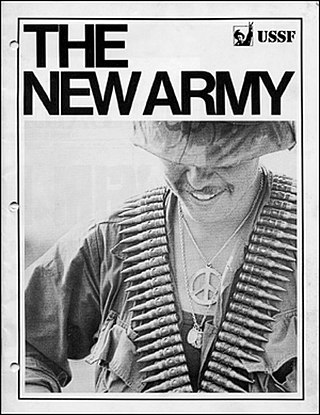
The United States Servicemen's Fund (USSF) was a support organization for soldier and sailor resistance to the Vietnam War and the U.S. military that was founded in late 1968 and continued through 1973. It was an "umbrella agency" that funded GI underground newspapers and GI Coffeehouses, as well as providing logistical support for the GI antiwar movement ranging from antiwar films and speakers to legal assistance and staff. USSF described itself as supporting a GI defined movement "to work for an end to the Viet Nam war" and "to eradicate the indoctrination and oppression that they see so clearly every day."

On June 5, 1969, during the height of the Vietnam War and the soldier and sailor resistance to it, 250 men rioted in the military stockade at U.S. Army post Fort Dix located near Trenton, New Jersey. The prisoners called it a rebellion and cited grievances including overcrowding, starvation, beatings, being chained to chairs, forced confessions and participation in an unjust war. One soldier said you can only treat us "like animals for so long", while another described "unbearable circumstances". The Army initially called it a "disturbance" caused by a small number of "instigators" and "troublemakers", but soon charged 38 soldiers with riot and inciting to riot. The antiwar movement, which had been increasingly recognizing and supporting resistance to the war within the military, quickly moved to defend the rebels/rioters and those the Army singled out for punishment. On June 18, the Army announced charges against 38 soldiers for "participating in a riot", "destruction of Government property, arson and conspiracy to riot." Soon the slogan "Free the Fort Dix 38" was heard in antiwar speeches, written about in underground newspapers and leaflets, and demonstrations were planned.




















